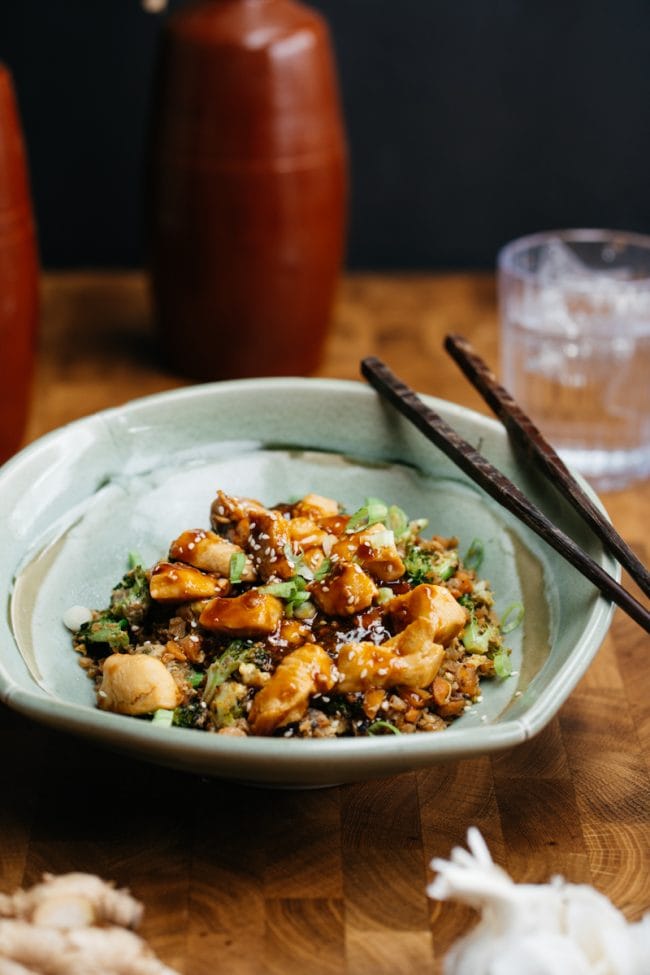Stevia and monk fruit are some of the most popular sweeteners in the keto community. Both are natural and won’t kick you out of ketosis, making them a tasty yet healthy option to add to beverages and desserts.
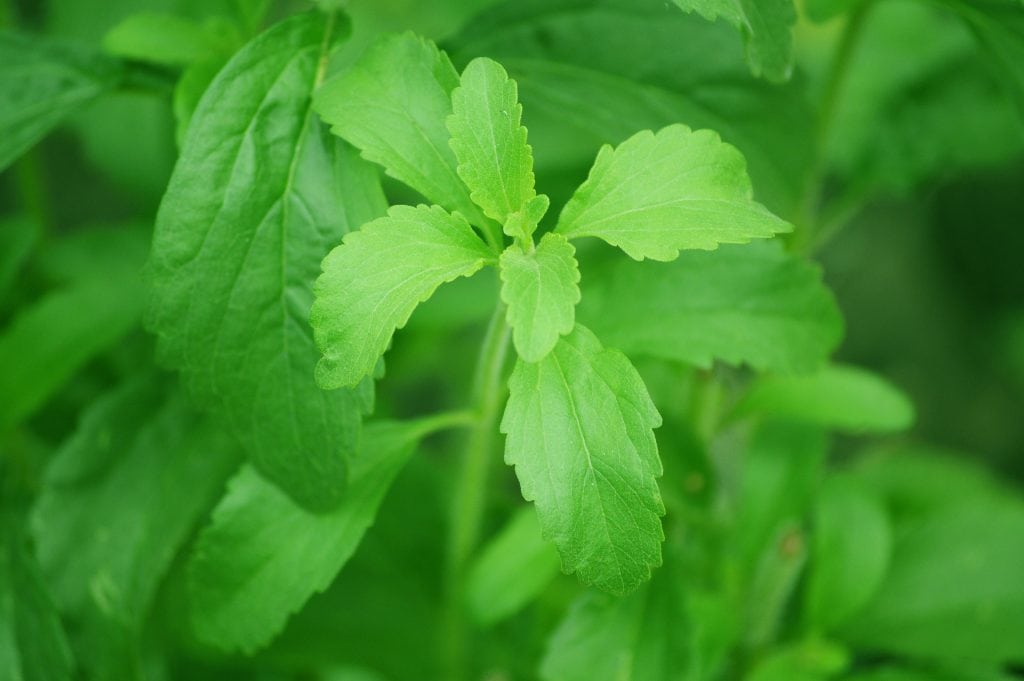
But this begs the question, which is better?
This post goes over the benefits and drawbacks of stevia vs monk fruit and how to know which is for you.
What’s the Difference Between Monk Fruit and Stevia?
Stevia and monk fruit are both natural sweeteners derived from much sweeter and healthier plants than sugar cane.
The stevia plant, also known as Stevia rebaudiana, is part of the chrysanthemum family. One packet of stevia powder is as sweet as two teaspoons of sugar and contains:
- Zero calories
- One gram of net carbs
- Zero fat or protein
This makes stevia super helpful for anyone looking to quit sugar.
Monk fruit is another natural sweetener popular amongst keto dieters. It’s a small gourd that looks similar to watermelon and was first grown in Asia during the 13th century by Buddhist monks.
Monk fruit is widely used because it’s 150 to 250 times sweeter than table sugar, so you only need a little bit. This sweetness comes from mogrosides, a completely different molecule to sugar, and it doesn’t spike blood glucose levels. A 2013 study even found that mogrosides help relieve oxidative stress.
In one packet of monk fruit sweetener, you’ll find:
- 0.8 grams of carbs
- Zero calories or carbs
- Zero protein or fat
Now that we know what stevia and monk fruit are, let’s cover the benefits and drawbacks of each.
What are The Benefits of Stevia?
Here are the pros of using stevia extract in teas, coffees and desserts:
- It’s available in different forms
- Stevia promotes weight loss
- It doesn’t affect insulin and sugar levels like other sweeteners
Stevia Sweeteners Are Available In Different Forms
At your local health shop or grocery store, you’ll find stevia in a liquid, granular and powder form.
This is convenient because you can add the liquid to your coffee to sweeten it or use the granules for cakes and desserts. This makes it an excellent all-around keto sweetener since it’s healthy, tasty and convenient.
Personally, I like adding stevia liquid to my coffee in the morning with some MCT oil. The granules are also a good option when cooking because it’s heat stable; however, be careful of adding too much since it’s quite sweet.
It Promotes Weight Loss
Weight loss is the main reason why people are drawn to stevia or any natural sweetener.
Obesity is a significant factor behind almost every chronic condition like heart disease, diabetes, kidney disorder and cancer. The culprit behind obesity is sugar added to most foods, even “healthy” ones like orange juice, yogurt and fruit.
This is why many companies are selling sugar-free products. Unfortunately, these products contain artificial sweeteners, which can be even more harmful than sugar.
But stevia is a natural sweetener that doesn’t only help you lose weight but also keeps you fuller for longer.
Stevia Doesn’t Affect Insulin and Blood Sugar
If you’re suffering from type 2 diabetes or simply want to keep insulin low, stevia can help. Unlike artificial sweeteners that spike insulin and blood sugar, several studies find stevia to have no adverse effect on insulin.
Many healthcare professionals recommend stevia as a sugar alternative for those suffering from diabetes, obesity and high blood pressure.
What Are The Drawbacks of Stevia?
Although stevia offers compelling benefits to keto-dieters, there are a few cons.
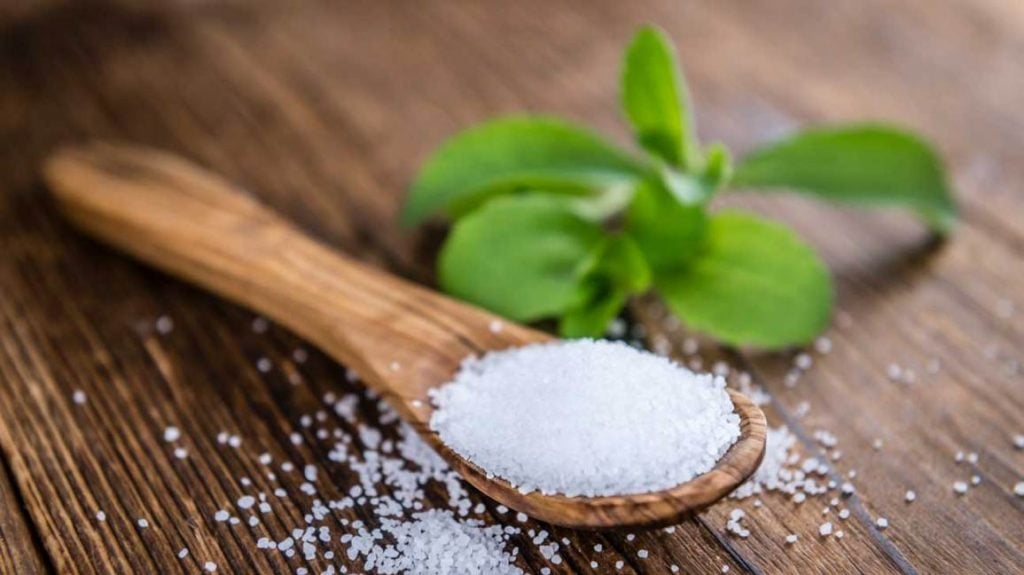
Bitter Aftertaste
After using stevia, you’ll notice a distinct bitter taste. If you’re using liquid stevia to sweeten your coffee or tea, this taste is much less, but still there. You’ll get used to it after a few days; however, initial use can be unpleasant.
Excessive Consumption Can Cause A Runny Stomach
Consuming too much stevia and other sugar alcohols tend to have a laxative effect.
This laxative effect mainly occurs when eating lots of desserts flavored with stevia. It’s made even worse if you’re using another sugar alcohol like erythritol.
But if you’re adding a few packets to your morning coffee, you aren’t consuming enough to experience a runny stomach.
What are The Benefits of Monk Fruit?
Monk fruit extract is a potent natural sweetener that can empower the lives of keto-dieters because:
- It’s anti-inflammatory
- It fights cancer cells
- You only need a little since it’s so sweet
Pure Monk Fruit Extract Is Anti-Inflammatory
Mogrosides, the molecule in monk fruit that gives it sweetness, are also found to have anti-inflammatory effects. According to a 2011 study, mogrosides prevent inflammation and the oxidation of cells.
This is good news because inflammation is a big reason behind chronic diseases, and by drinking monk fruit with your coffee, you’re helping your body fight inflammation caused by processed foods.
Monk Fruit Sweeteners Fight Cancer Cells
A 2016 study found monk fruit to have anti-cancer properties. The study concluded that mogroside inhibited the growth of pancreatic cancer cells and other tumor cells in a dose-dependent manner. Meaning, the more researchers used it, the more it fought cancer cells.
Another reason why using monk fruit can reduce your risk of cancer is because you won’t be eating as much sugar anymore. And several studies show excessive sugar consumption leads to the growth of cancer cells.
This is because sugar can trigger the formation of cancer. Cancer cells are different compared to our normal cells. It eats sugar, and this is why a pet scan works so well.
To find out if a patient has cancer, doctors will inject radiolabeled glucose to see what part of the body is hogging all the sugar. And the area that’s fermenting all the glucose is where the cancer lies.
So when you’re eating monk fruit instead of sugar, you’re starving these cancer cells.
You Only Need A Little
Monk fruit is 200 times sweeter than table sugar. So instead of buying a lot of sugar at the grocery store to sweeten your coffee, simply get some monk fruit sweetener. It comes in a small packet, and you can make your morning cup of joe taste better naturally.
Monk fruit is also helpful when cooking and baking.
However, I find it’s especially delicious when making frozen desserts like fudge or pudding. If you’re using xylitol or erythritol, you’ll bite into the granules when chewing, which is unpleasant. The granules also tend to settle at the bottom.
But with monk fruit, you won’t experience any of this. When eating keto fudge, the sweetness is evenly spread.
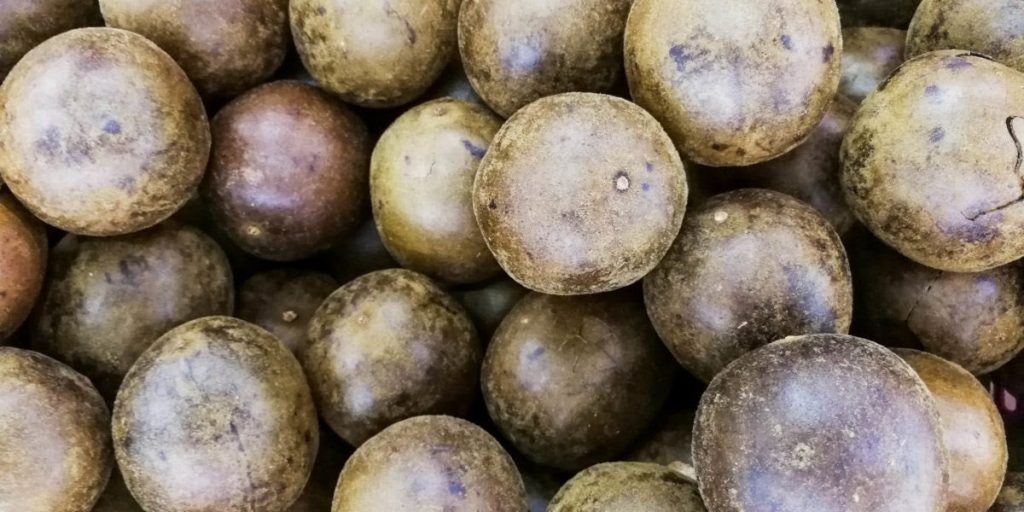
What Are The Drawbacks of Monk Fruit?
There are some drawbacks to monk fruit that’ll push you towards other natural sweeteners like stevia and xylitol.
Monk Fruit Sweeteners Are Expensive
Fresh monk fruit is difficult to grow and import, making it quite expensive to buy. Since it’s so costly, many companies add dextrose and other artificial sweeteners to bring the price down. And as you probably know, these artificial sweeteners are basically sugar because they spike blood glucose levels and trigger inflammation.
When shopping for monk fruit, read the label to see if it’s mixed with other sweeteners.
It Triggers Allergies
Monk fruit is closely related to cucumbers which are part of the gourd family. So if you have a gourd allergy, avoid monk fruit since it triggers reactions like itchy eyes and runny nose.
Instead, opt for stevia or xylitol. Both are natural sugar alcohols and won’t spike insulin or glucose levels.
How to Choose The Right Sweetener For You
When choosing a suitable sweetener for your keto needs, ask yourself the following questions:
- Are you baking with it, or do you want to add it to coffee?
- Are you diabetic and worry about your blood sugar levels?
- Do you mind the bitter aftertaste?
Both sweeteners are flexible since you can use them in coffee, tea, sauces, desserts, smoothies and dressings. They are also heat stable, so you can bake and cook with it.
Stevia and monk fruit are similar, but they have key differences. If you’re making frozen desserts, I highly recommend monk fruit. It doesn’t settle at the bottom like stevia or xylitol. But if you’re mainly looking to sweeten beverages, opt for stevia. It tastes similar to sugar, and you need much less.
Is Stevia and Monk Fruit Safe For Diabetics?
Both stevia and monk fruit don’t spike blood glucose and insulin levels, making it safe for diabetics. It also doesn’t contain any calories, carbs or artificial ingredients, so it won’t trigger inflammation.
You may also like our guide on the Best Sugar Substitute for Keto.
What Are Some Alternatives?
Consider these natural options if you want to spice up your keto diet by swapping out stevia and monk fruit for other sweeteners.
Xylitol
If you’re looking for a sweetener that doesn’t have a bitter aftertaste, get some xylitol. It tastes just like sugar but without the adverse health effects.
Xylitol has a GI score of 7, affecting blood sugar and insulin levels when consumed in excessive amounts. But if you’re adding a few teaspoons to your coffee or using it to make desserts, it won’t spike blood glucose.
When shopping for xylitol, get non-GMO, organic xylitol. Companies can make xylitol from GMO corn, and you don’t want to eat that because it’s sprayed with an herbicide called glyphosate. This chemical increases your risk of developing leaky gut, endocrine disruption and even cancer.
Erythritol
Erythritol is a natural sugar alcohol similar to xylitol and has 70% the sweetness of table sugar. Its GI score is zero, making it a better option than xylitol for diabetics or those looking to lower their insulin and blood glucose levels.
We all know about the dental health benefits of xylitol, but recent studies find erythritol to be even more effective at preventing cavities.
Final Thoughts on Stevia Vs Monk Fruit Extract
Monk fruit and stevia are some of the most popular keto-friendly sweeteners, and for good reason.
They don’t affect insulin and blood sugar levels, making it a healthy option for diabetics. Both sweeteners also don’t contain carbs or calories, so they’ll help with weight loss and won’t kick you out of ketosis.
In short, use stevia granules or syrup in your morning coffee because it tastes similar to regular sugar. Use monk fruit to make frozen desserts because it won’t settle at the bottom as xylitol or erythritol.
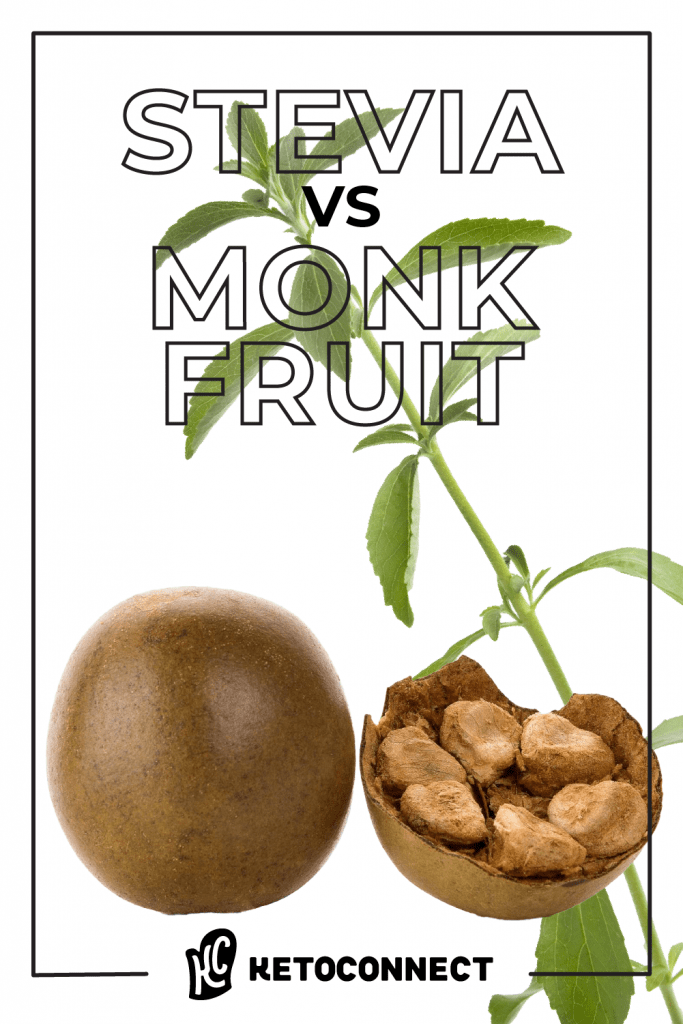
Written by
Matt Gaedke
Matt is a former college basketball player turned computer engineer who discovered his passion for health and nutrition after cutting sugar from his diet in 2016. That year he founded KetoConnect with Megha in order to share their ketogenic lifestyle through recipes, videos, and educational content. Matt is always seeking to grow and try new things, a passion he shares with his wife and two amazing sons.

